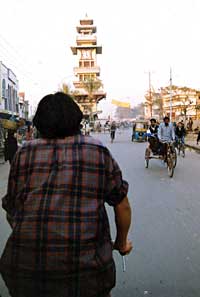 The central tarai and Birganj used to be known as the least Maoist-affected area of the country. But since the collapse of the ceasefire last August, there has been a dramatic increase in Maoist control in the region. This is not due to the Maoist's own strengths, but rather the vacuum left by the dissolution of elected local bodies, the pullback of police and the lack of political will to deploy security forces.
The central tarai and Birganj used to be known as the least Maoist-affected area of the country. But since the collapse of the ceasefire last August, there has been a dramatic increase in Maoist control in the region. This is not due to the Maoist's own strengths, but rather the vacuum left by the dissolution of elected local bodies, the pullback of police and the lack of political will to deploy security forces. The Maoists have now made Birganj their prize. A border town and an affluent trading city, it is not only a safe transit point for Maoists crossing over into India but also an ideal place to extort money from businesses, shops and factories along the Birganj-Simara highway.
The assassination of Birganj's popular mayor Gopal Giri in April was the final proof that the rebels have made the control of Birganj an important priority because this would not only give them access to 'donations' but also controlling Birganj will mean control over what goes in and out of Kathmandu.
In the hinterland, the Maoiss have been trying to win over the people by starting a campaign to confiscate jamindars' property and redistribute it to the landless, and by killing dacoits who used to be notorious in the area.
The police are confined to the barracks and hardly venture out. Twelve policemen were killed in a Maoist landmine attack last month near Birganj while they were on their way to investigate the kidnapping of a local businessman. "We are preparing for a decisive and final battle," says Maoist head of the Bara 'peoples' government', Shibachandra Kushbaha.
However, the army in Birganj denies that the Maoists are gaining the upper hand. They admit the Maoists have increased extortion and the use of terror, but they dismiss claims that they can capture tarai towns. Indeed, senior Maoist commanders as well as leaders in their people's governments have been killed in the past year. Among those killed was the chief of the Maoist Tarai Special Company, Bir Bahadur Khadka (Amar).
But for ordinary people there is no respite. Says Ramswarup Prasad of Pokhariya in Parsa: "We are caught between the guns of the Maoists, the army and the dacoits." (Chandra Kishore in Birganj)


